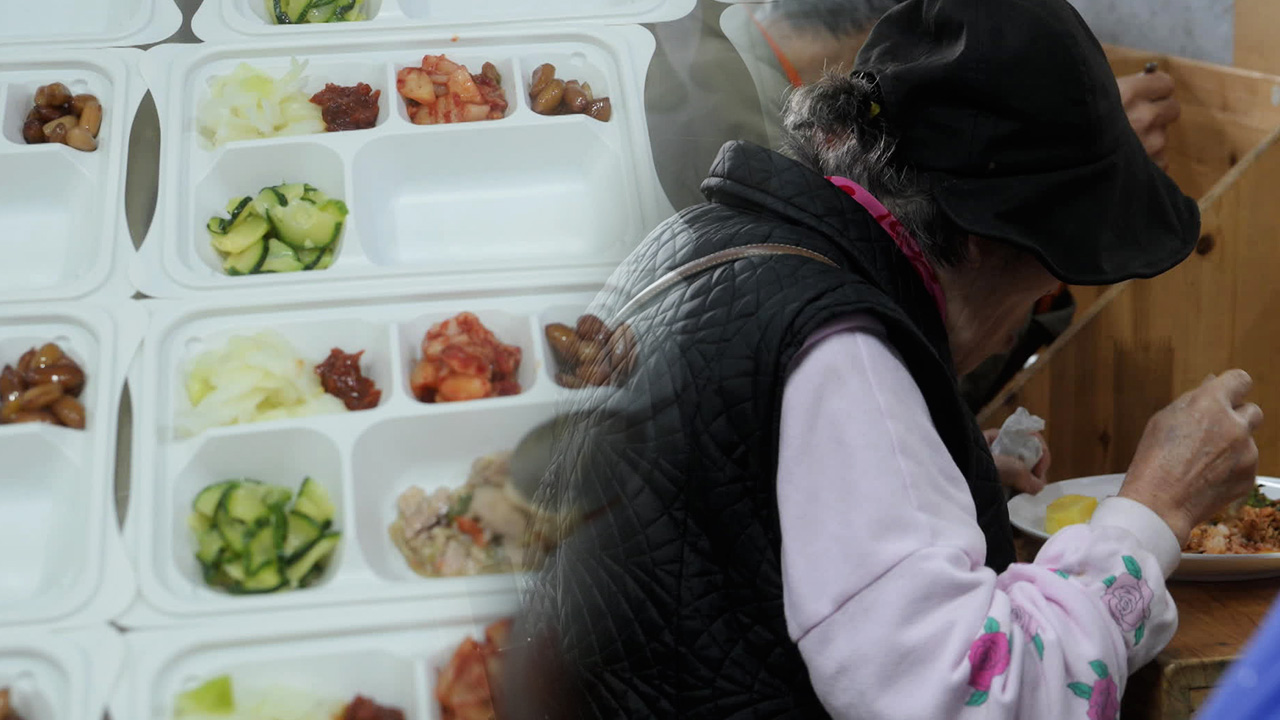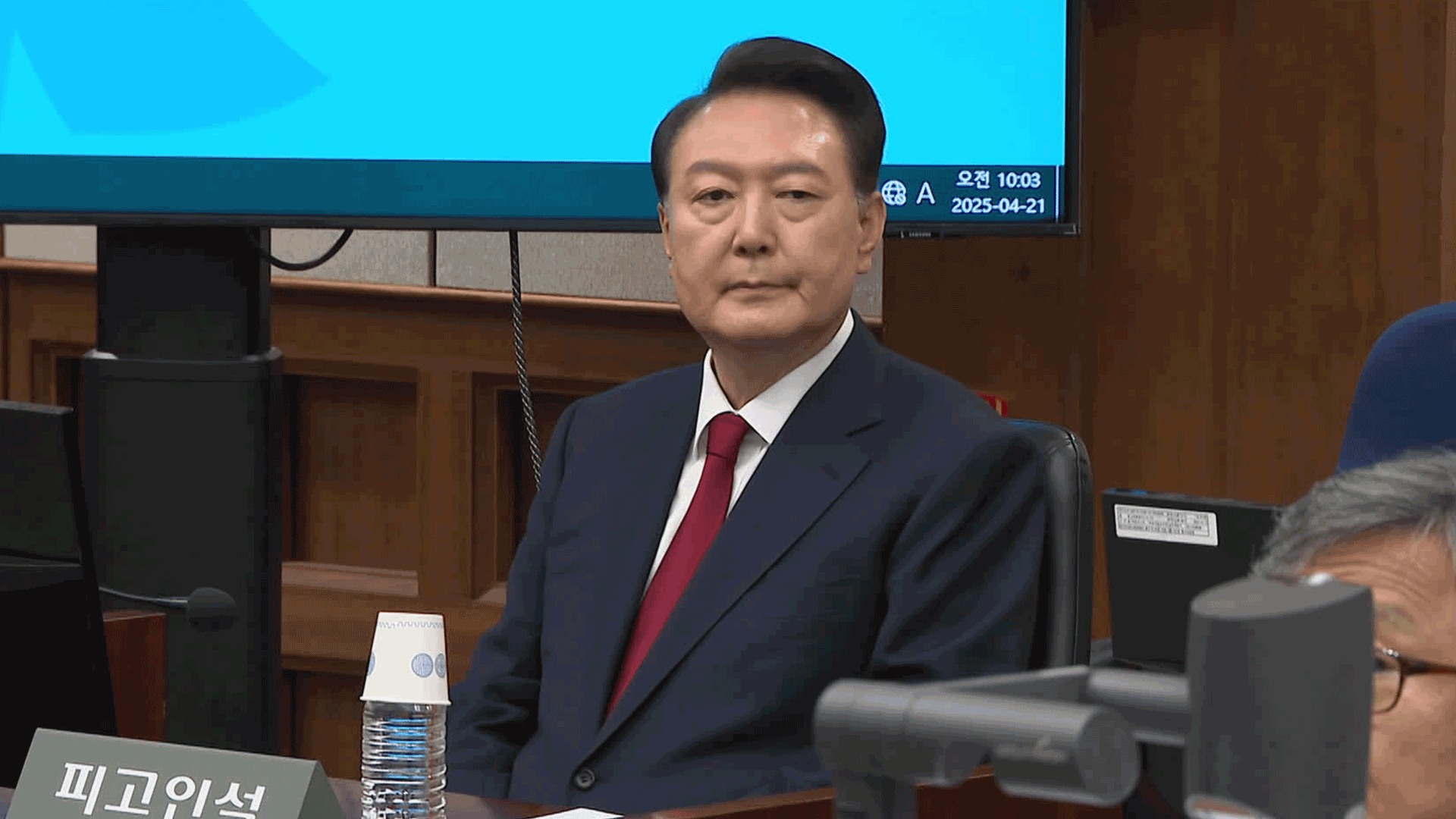In the era of ten million elderly, 35% suffer from poor nutrition
입력 2024.11.25 (00:40)
읽어주기 기능은 크롬기반의
브라우저에서만 사용하실 수 있습니다.
[Anchor]
There are many elderly people who skip meals or eat alone.
According to a government survey, 35% of the elderly population is in poor nutritional condition.
As we enter the era of a 10 million elderly population, the importance of meal support policies for the elderly is increasing.
Reporter Kim Chae-rin has the story.
[Report]
Side dishes are divided into lunch boxes.
These are customized lunch boxes for elderly people suffering from diabetes and high blood pressure.
[Lee Kyung-ja/Lunch Box Company Employee: "Meat is included almost every day."]
This lunch box company has been receiving support from local governments for the past two years, delivering lunch and dinner five days a week to 100 low-income elderly people.
["Sir, the lunch box has arrived."]
Seoul City will also start a pilot project next month to deliver meals to 325 low-income elderly people in Gangseo-gu and Dongdaemun-gu.
This is due to the increasing number of people waiting for free meals at welfare centers.
[Kim Jeong-hyun/Professor of Social Welfare at Hankyong National University: "Because there are too many people waiting, it will be difficult for local government budgets to handle providing meals in the form of senior dining rooms. The limits are approaching."]
Last year, about 157,000 low-income elderly people received meal support from local governments nationwide.
The budget amounted to over 178 billion won.
Recently, some local governments have started providing free meals to residents over 75 years old, regardless of income level.
[Kwon Yoon-young/Director of Elderly Support at Mapo-gu Office, Seoul: "Even if they have a lot of assets, if they are alone, they cannot have a balanced nutritional intake."]
According to last year's elderly status survey, 35% of the elderly need improvement in their nutritional status.
As the elderly population surpasses 10 million and the proportion of elderly living alone exceeds 20%, the importance of meal support policies is growing.
[Kim Ok-ja/81 years old: "How can I eat well, when I eat alone? I don't care much about what to eat, so my body is not healthy."]
There are also suggestions that providing a solid meal for the elderly can reduce greater social costs.
[Gu Seul-i/Head of Health, Welfare, and Women Team at the National Assembly Legislative Research Service: "In reality, there are elderly people who say they want to enter nursing homes because cooking for themselves is too difficult, which can lead to increased medical and nursing costs. Therefore, it is time to recognize the importance of meal services again."]
This is KBS News, Kim Chae-rin.
There are many elderly people who skip meals or eat alone.
According to a government survey, 35% of the elderly population is in poor nutritional condition.
As we enter the era of a 10 million elderly population, the importance of meal support policies for the elderly is increasing.
Reporter Kim Chae-rin has the story.
[Report]
Side dishes are divided into lunch boxes.
These are customized lunch boxes for elderly people suffering from diabetes and high blood pressure.
[Lee Kyung-ja/Lunch Box Company Employee: "Meat is included almost every day."]
This lunch box company has been receiving support from local governments for the past two years, delivering lunch and dinner five days a week to 100 low-income elderly people.
["Sir, the lunch box has arrived."]
Seoul City will also start a pilot project next month to deliver meals to 325 low-income elderly people in Gangseo-gu and Dongdaemun-gu.
This is due to the increasing number of people waiting for free meals at welfare centers.
[Kim Jeong-hyun/Professor of Social Welfare at Hankyong National University: "Because there are too many people waiting, it will be difficult for local government budgets to handle providing meals in the form of senior dining rooms. The limits are approaching."]
Last year, about 157,000 low-income elderly people received meal support from local governments nationwide.
The budget amounted to over 178 billion won.
Recently, some local governments have started providing free meals to residents over 75 years old, regardless of income level.
[Kwon Yoon-young/Director of Elderly Support at Mapo-gu Office, Seoul: "Even if they have a lot of assets, if they are alone, they cannot have a balanced nutritional intake."]
According to last year's elderly status survey, 35% of the elderly need improvement in their nutritional status.
As the elderly population surpasses 10 million and the proportion of elderly living alone exceeds 20%, the importance of meal support policies is growing.
[Kim Ok-ja/81 years old: "How can I eat well, when I eat alone? I don't care much about what to eat, so my body is not healthy."]
There are also suggestions that providing a solid meal for the elderly can reduce greater social costs.
[Gu Seul-i/Head of Health, Welfare, and Women Team at the National Assembly Legislative Research Service: "In reality, there are elderly people who say they want to enter nursing homes because cooking for themselves is too difficult, which can lead to increased medical and nursing costs. Therefore, it is time to recognize the importance of meal services again."]
This is KBS News, Kim Chae-rin.
■ 제보하기
▷ 카카오톡 : 'KBS제보' 검색, 채널 추가
▷ 전화 : 02-781-1234, 4444
▷ 이메일 : kbs1234@kbs.co.kr
▷ 유튜브, 네이버, 카카오에서도 KBS뉴스를 구독해주세요!
- In the era of ten million elderly, 35% suffer from poor nutrition
-
- 입력 2024-11-25 00:40:16

[Anchor]
There are many elderly people who skip meals or eat alone.
According to a government survey, 35% of the elderly population is in poor nutritional condition.
As we enter the era of a 10 million elderly population, the importance of meal support policies for the elderly is increasing.
Reporter Kim Chae-rin has the story.
[Report]
Side dishes are divided into lunch boxes.
These are customized lunch boxes for elderly people suffering from diabetes and high blood pressure.
[Lee Kyung-ja/Lunch Box Company Employee: "Meat is included almost every day."]
This lunch box company has been receiving support from local governments for the past two years, delivering lunch and dinner five days a week to 100 low-income elderly people.
["Sir, the lunch box has arrived."]
Seoul City will also start a pilot project next month to deliver meals to 325 low-income elderly people in Gangseo-gu and Dongdaemun-gu.
This is due to the increasing number of people waiting for free meals at welfare centers.
[Kim Jeong-hyun/Professor of Social Welfare at Hankyong National University: "Because there are too many people waiting, it will be difficult for local government budgets to handle providing meals in the form of senior dining rooms. The limits are approaching."]
Last year, about 157,000 low-income elderly people received meal support from local governments nationwide.
The budget amounted to over 178 billion won.
Recently, some local governments have started providing free meals to residents over 75 years old, regardless of income level.
[Kwon Yoon-young/Director of Elderly Support at Mapo-gu Office, Seoul: "Even if they have a lot of assets, if they are alone, they cannot have a balanced nutritional intake."]
According to last year's elderly status survey, 35% of the elderly need improvement in their nutritional status.
As the elderly population surpasses 10 million and the proportion of elderly living alone exceeds 20%, the importance of meal support policies is growing.
[Kim Ok-ja/81 years old: "How can I eat well, when I eat alone? I don't care much about what to eat, so my body is not healthy."]
There are also suggestions that providing a solid meal for the elderly can reduce greater social costs.
[Gu Seul-i/Head of Health, Welfare, and Women Team at the National Assembly Legislative Research Service: "In reality, there are elderly people who say they want to enter nursing homes because cooking for themselves is too difficult, which can lead to increased medical and nursing costs. Therefore, it is time to recognize the importance of meal services again."]
This is KBS News, Kim Chae-rin.
There are many elderly people who skip meals or eat alone.
According to a government survey, 35% of the elderly population is in poor nutritional condition.
As we enter the era of a 10 million elderly population, the importance of meal support policies for the elderly is increasing.
Reporter Kim Chae-rin has the story.
[Report]
Side dishes are divided into lunch boxes.
These are customized lunch boxes for elderly people suffering from diabetes and high blood pressure.
[Lee Kyung-ja/Lunch Box Company Employee: "Meat is included almost every day."]
This lunch box company has been receiving support from local governments for the past two years, delivering lunch and dinner five days a week to 100 low-income elderly people.
["Sir, the lunch box has arrived."]
Seoul City will also start a pilot project next month to deliver meals to 325 low-income elderly people in Gangseo-gu and Dongdaemun-gu.
This is due to the increasing number of people waiting for free meals at welfare centers.
[Kim Jeong-hyun/Professor of Social Welfare at Hankyong National University: "Because there are too many people waiting, it will be difficult for local government budgets to handle providing meals in the form of senior dining rooms. The limits are approaching."]
Last year, about 157,000 low-income elderly people received meal support from local governments nationwide.
The budget amounted to over 178 billion won.
Recently, some local governments have started providing free meals to residents over 75 years old, regardless of income level.
[Kwon Yoon-young/Director of Elderly Support at Mapo-gu Office, Seoul: "Even if they have a lot of assets, if they are alone, they cannot have a balanced nutritional intake."]
According to last year's elderly status survey, 35% of the elderly need improvement in their nutritional status.
As the elderly population surpasses 10 million and the proportion of elderly living alone exceeds 20%, the importance of meal support policies is growing.
[Kim Ok-ja/81 years old: "How can I eat well, when I eat alone? I don't care much about what to eat, so my body is not healthy."]
There are also suggestions that providing a solid meal for the elderly can reduce greater social costs.
[Gu Seul-i/Head of Health, Welfare, and Women Team at the National Assembly Legislative Research Service: "In reality, there are elderly people who say they want to enter nursing homes because cooking for themselves is too difficult, which can lead to increased medical and nursing costs. Therefore, it is time to recognize the importance of meal services again."]
This is KBS News, Kim Chae-rin.
-
-

김채린 기자 dig@kbs.co.kr
김채린 기자의 기사 모음
-
이 기사가 좋으셨다면
-
좋아요
0
-
응원해요
0
-
후속 원해요
0















이 기사에 대한 의견을 남겨주세요.